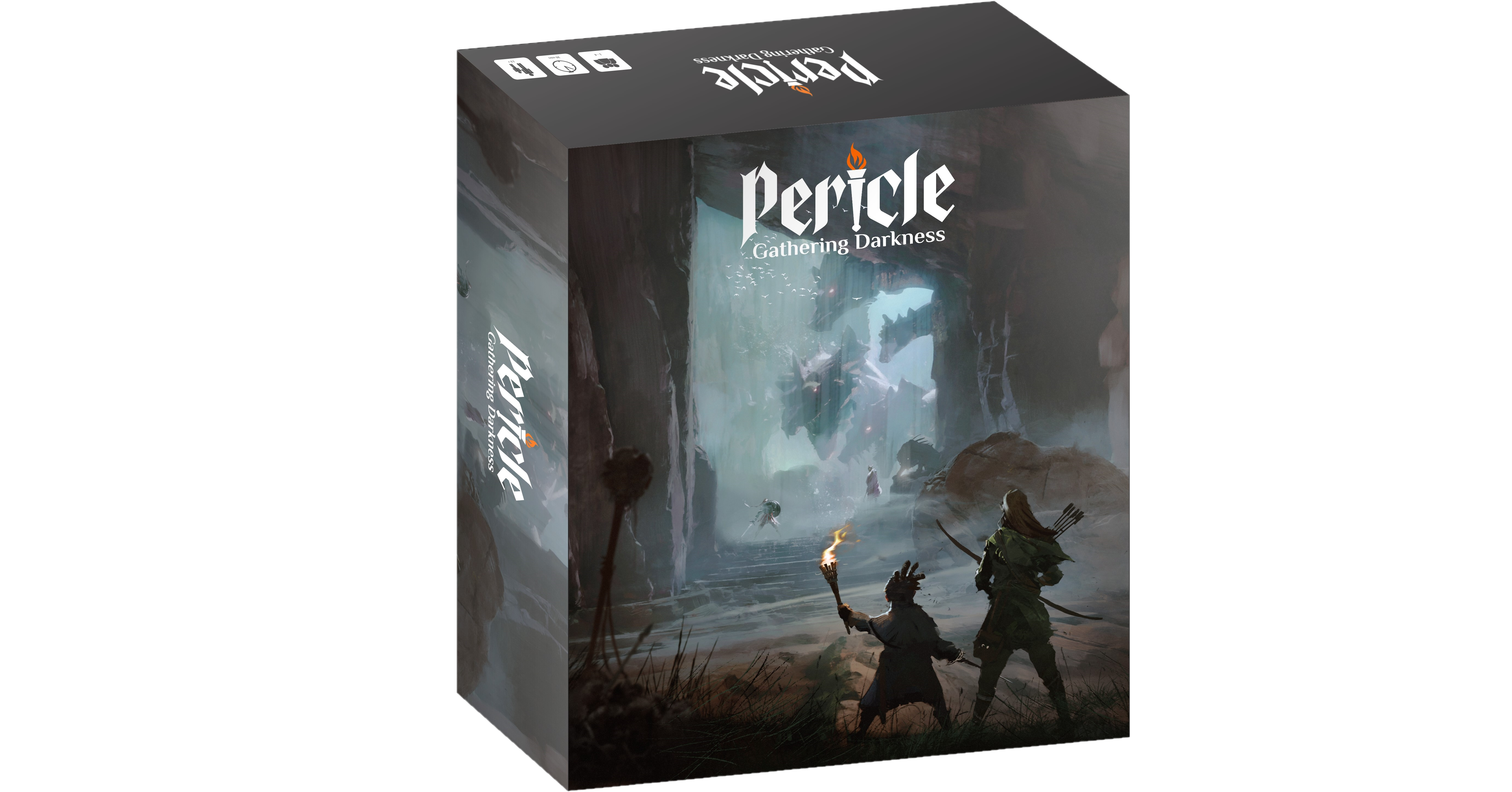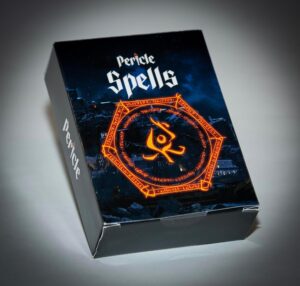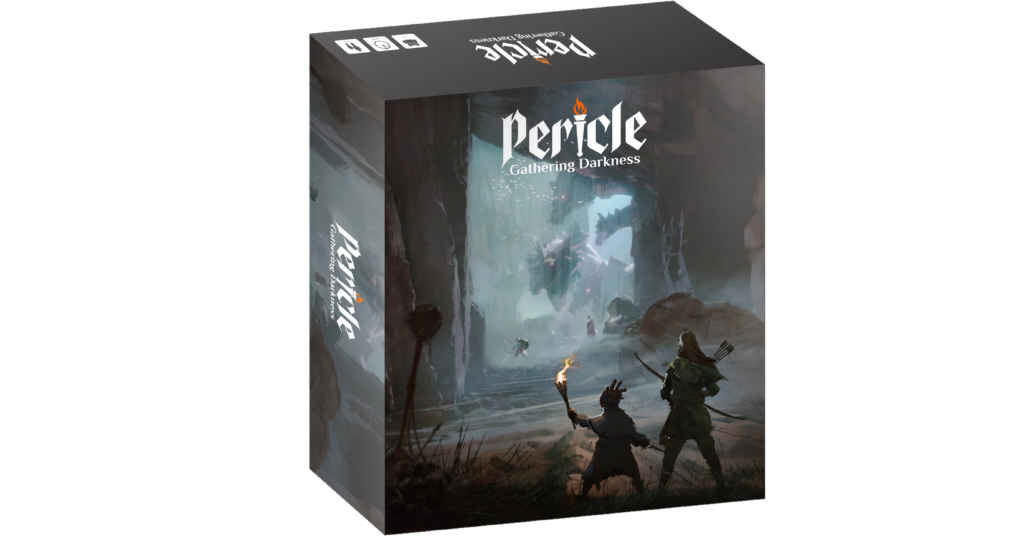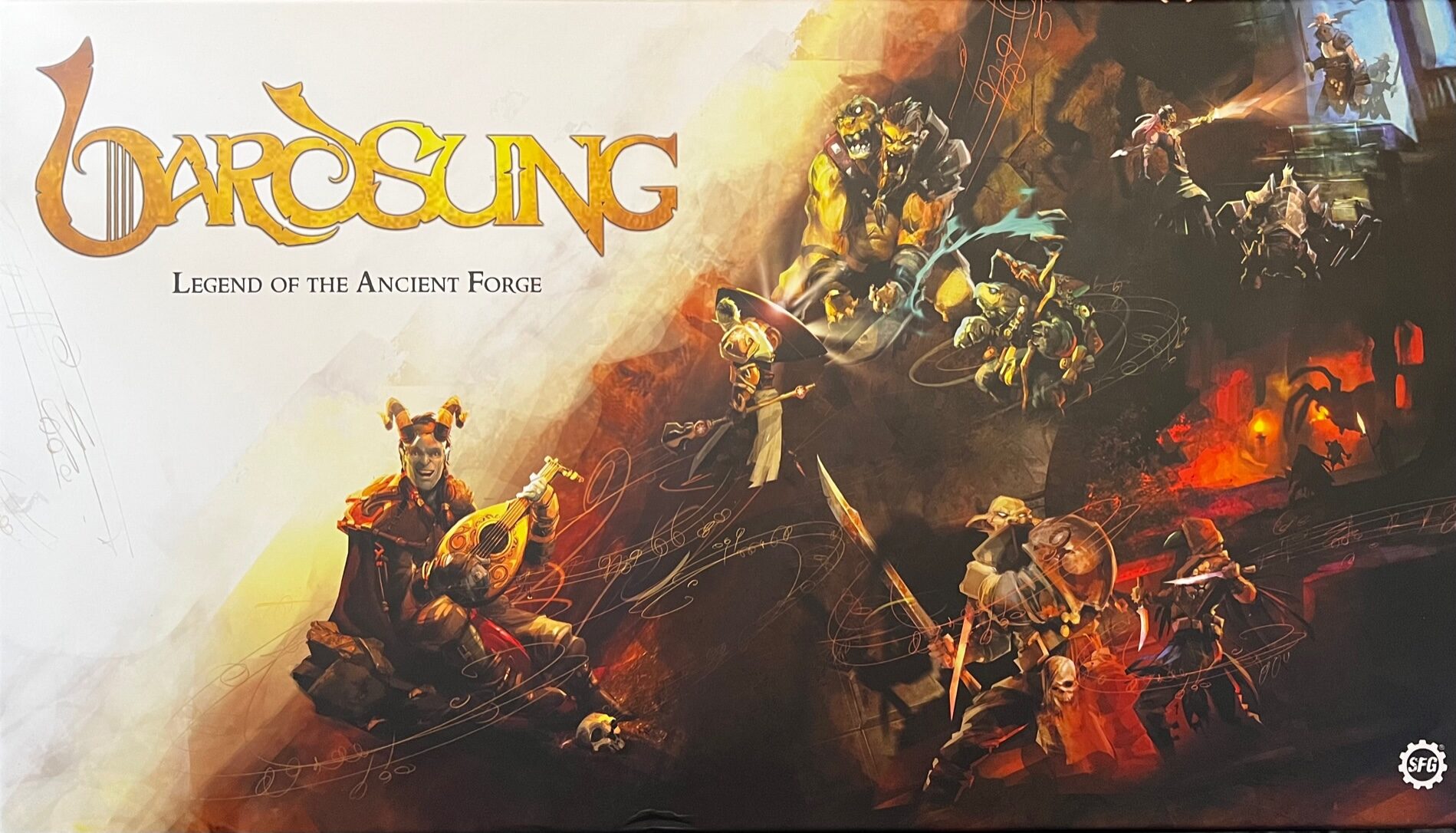Welcome to Pen and Die’s Pericle: Gathering Darkness Review! The wonderful people at Long Dog Games were kind enough to send us a review copy. Pericle brings the tabletop tactics and dramatic storyline of a Tabletop RPG without requiring a player to run the whole thing as the Dungeon Master. Rather, Pericle uses an app that tracks events, player decisions, story progression, and enemy behavior to deliver an experience akin to the marriage of an adventure book to a table top RPG. Pericle doesn’t bring a huge number of components to the table, but it does bring outstanding quality.
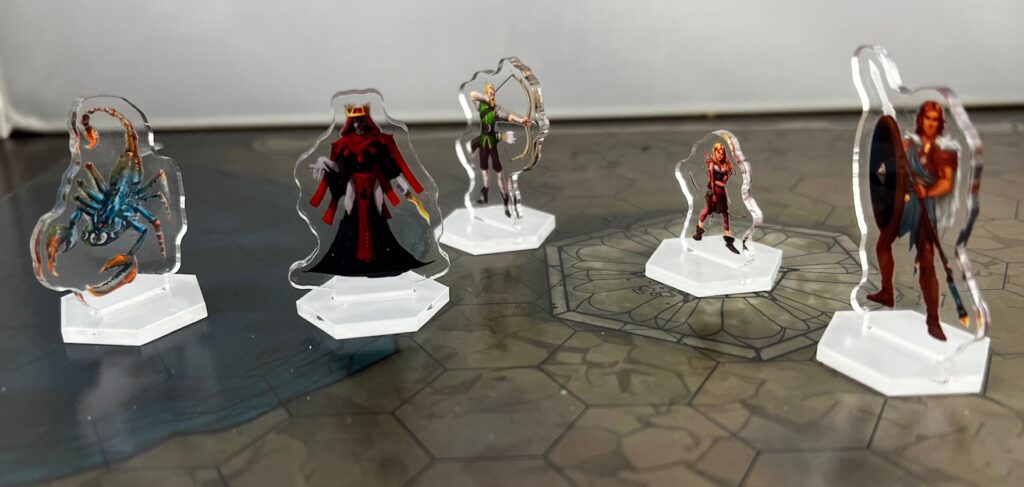
Check out our unboxing article here:
The System
Pericle features a unique system to determine the outcome of skill checks and attacks. To be clear, Pericle rolls more like a simple RPG than a board game. The creators spread the rules across two books: the aptly named Rulebook and the Hero Handbook. The Rulebook covers all of the basic mechanics while the Hero Handbook delves deeper with hero creation, advancement, and spellcasting. Both rule books have quality glossy pages and nice layouts that allow for reasonably quick searching. Unfortunately, neither rule book contains an index so the best bet is the Table of Contents. Luckily, the author didn’t fall into the TTRPG trap of putting random things in random places so you can usually find items where expected.
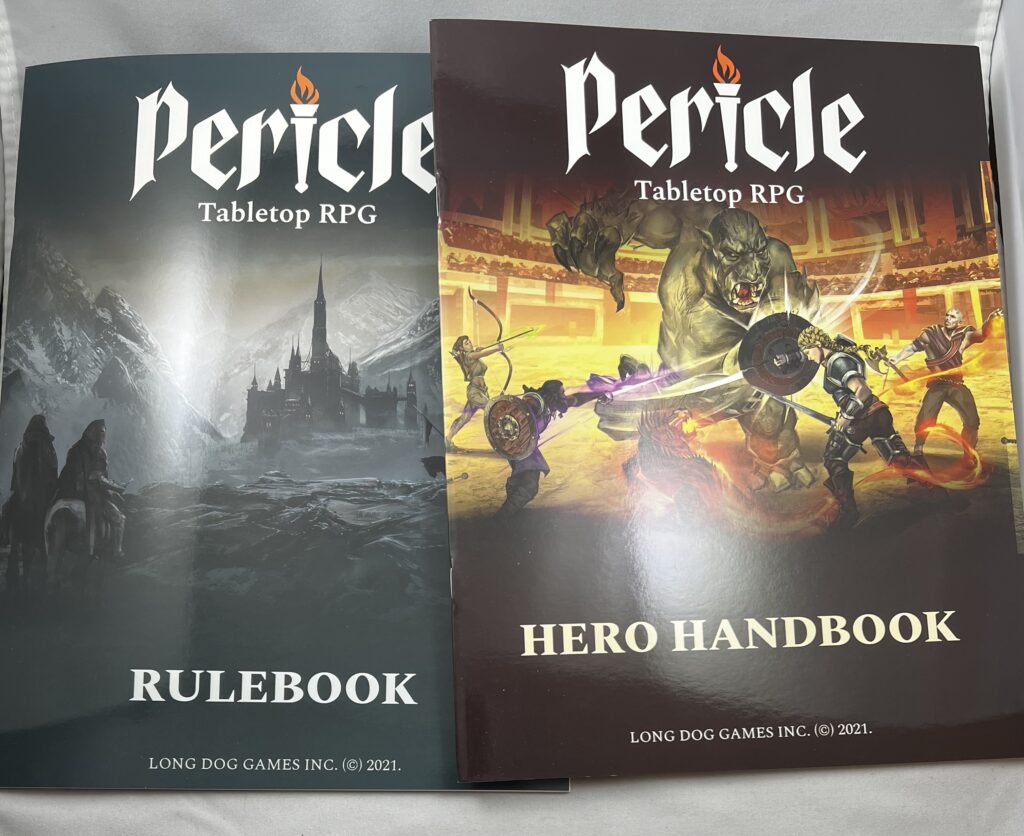
Making Checks
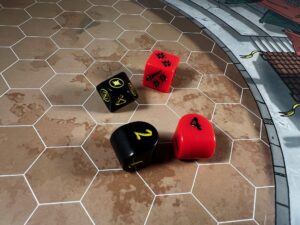
Checks are a generally simple affair using a modified roll under mechanic. The action die has ten custom sides. Four of the sides have the success symbol, one has a critical success symbol, one has a failure mark, and the others are numbered one through four. Players will check the skill level or their combat level and compare it against the number that they rolled, assuming they didn’t roll a success or failure out right. Players are hoping to roll equal to or under their skill/combat score. Consequently, a fairly large majority of rolls will be successes. This mechanic suggests that the game will tend towards being easy. However, enemies use the same mechanic to roll to hit so basically everyone will be getting hit pretty often. Players generate damage using D4’s and D6’s. A custom six sided critical die supplies the effect of a critical success on an attack.
Kin
Creating a character involves choosing from five Kin that will bestow a species bonus. Humans begin with extra XP to spend, while dwarves get enhanced might and darkvision. Odrim, sort of a dark elf kin with a magical tradition, enjoy a 1 XP discount on all spells. Forest Elves have advantages on learning spells, opposed spell checks, and receive a higher movement speed. Finally, the Everkin take the title of the smallest kin, resembling halflings. They can boast of an advantage on skill checks, escaping grapple attempts, and darkvision. No restrictions will impede players in making their characters, but obviously some kin are more suited to certain kinds of characters than others. The pregenerated character group contains representatives from every kin.
Attributes
Each character uses three attributes: Might, Dexterity, and Knowledge. Might determines starting Hit Points and the weight of weapon that a character can use. The heavier a weapon is, the more damage it deals. Dexterity establishes the Base Action Die (AD) which is the score needed to roll under to succeed on checks. Dex also contributes to the initiative roll at the beginning of each round. Knowledge adds to starting XP that will be used to create a character but does not affect XP past the creation process. Otherwise, Knowledge is basically only used as a prerequisite for acquiring higher level spells and Disciplines. We’ve seen a few instances of attribute checks coming up in the story, mostly Might.
Skills
Players will purchase skill ranks with XP for their characters. These work the same as other checks with players hoping to roll equal to or under the skill rank on on the action die. Skills are not associated with Attributes and are purchased at the cost of 2XP/rank. Skill checks arise throughout the story, usually requiring a certain number of the group to pass in order to proceed in a certain story direction. Some are pertinent in combat as well such as Athletics for jumping over obstacles (which the game encourages you to do often). Players purchase up to five ranks in each skill. While this would normally be overkill considering that the action die only numbers up to 4, the story will sometimes declare that a check is difficult and apply a penalty such as -2.
Defense
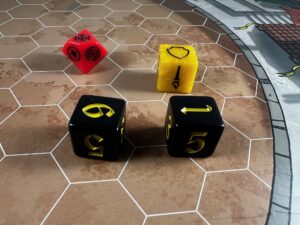
Certain situations, such as taking cover, provide the use of a defense die. Another custom D6, the defense die will block attacks 50% of the time providing some much needed relief in combat. Your choices and circumstances can allow you to gain multiple defense dice for a round that will apply to all attacks that target you. Otherwise, characters do not have a defense score or armor class. Armor does still play an important role as damage reduction.
Spellcasting
Spells require both a roll and the expenditure of Exhaustion, a resource that combines with wounds to lower your current hit point total but that partially recovers between encounters. Combat takes the nearly sole focus in the spell list but there are a great variety of tactical options. Standard damage dealing, debuff, buff, area attack, shapeshifting, and necromancy spells fill the available spell list. Only a few such as candelight and augury cause an effect outside of battle. Pericle uses a classless system so any hero may spend xp to learn spells and will use their Base AD to determine casting success. Certain Disciplines affect spellcasting to achieve additional effects or synergies. Spells can be fairly complex and involve numerous pieces of information. Long Dog Games offers a few different accessories, but I would most suggest the deck of spell cards to make life easier when casting. You can find them here.
Movement
Movement varies a bit from other board games and RPG’s. Players and foes make initiative rolls at the beginning of each round. Initiative determines which side will move first as well as breaking ties in action order. The side winning initiative moves all of its characters according to their movement speed. The other side follows and then actions occur according to the base AD of each character. Round construction and movement rules are currently my least favorite part of the game. I’m trying to remain open minded about it though and consider the tactical challenges that come with it. However, I still feel like the more standard “move and act” turn sequence of almost all board games and TTRPG’s is more apt. Movement also restricts the actions that can be taken during a character’s turn. If a character moved more than one space, then they are not able to undertake complex or precise actions such as casting a spell or making a ranged attack without having taken a Talent that grants them the ability. This rule makes a lot of sense and there’s a handy chart on the rule cheat sheets to let you know what actions are available.
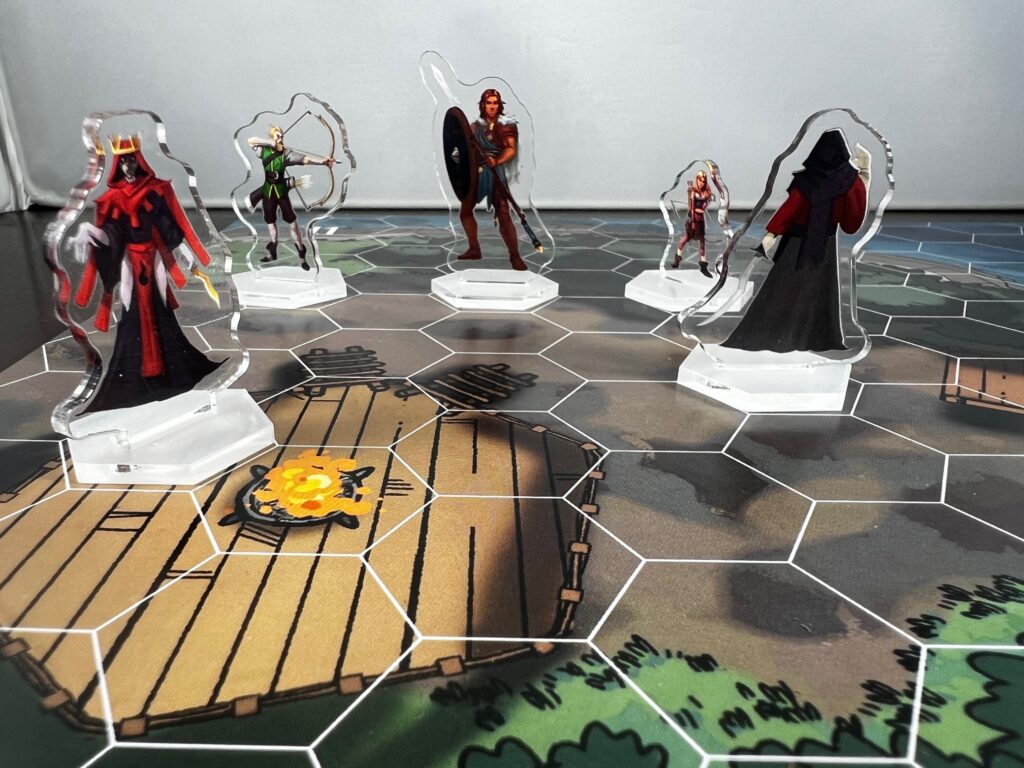
Disciplines
Emulating feats from the ampersand game, Disciplines will give your character new and useful abilities. Many allow a hero to circumvent the rules that apply to the majority of characters such as moving more than one space and making a ranged attack. Disciplines come at the cost of XP, with each having its own requirement. The Disciplines mostly bring variation to your characters’ combat abilities although a small few have purposes outside of combat. Similar to spells, Disciplines require nothing beyond XP, except for a few levelled Disciplines that require the previous level, and a certain knowledge level to purchase. Most of the bonuses provided by Disciplines are relatively modest but always impactful.
The Components
Pericle stands out with some fantastic components in the box. Many of these will be usable for other games as will. A game of this length and size generally contains multiple sheets of tokens and tiles as well as decks of cards to unwrap. The app changes the experience on that front since it tracks conditions and contains all of the story information. I love punching out components, but it was also nice to not have a session dedicated solely to that. We are very pleased with all of the components that come with the game and think they represent a good value in themselves.
Standees
Pericle contains 75 wonderfully made acrylic standees. They cover the pregenerated heroes, monsters and other foes. The art is evocative and interesting with double sided stickers or print affixed to the back of the acrylic cutouts. The acrylic gives each standee a sense of depth with the image showing through the pieces. Standees fit tightly into their bases and are stable when put together. Pericle contains a great variety of standees although there is not a great variety of sizes. Standees will fit on either single hex bases or three-hex bases. Some of the boss monsters will be larger than your heroes, but there are not any that will absolutely tower over them.

Battle Maps
The battle maps set scenes beautifully with clear illustrations and hex marking. The maps bring exciting locations and tactical challenges to each scenario. Each one is bespoke so there is no random generation occurring here. While that may mean there is not a freeform, infinitely replayable dungeon to explore, each scenario is well thought out and unique. I love a random dungeon, but arranging the same tiles in different ways is not the same as something intentionally created. The thick cardboard of the battle maps ensures that they sit flat on the table and feels sturdy. Battles will run across ships at sea, bridges spanning an elevated village, caves, and ruins. Some of the maps even have interlocking tabs on the ends so that they can be connected to others, forming double sized maps for battles. Loremaster (the app) will point out on the map if there is special terrain or features. Some of these will cause characters difficulty moving or will allow for cover or high ground advantage.
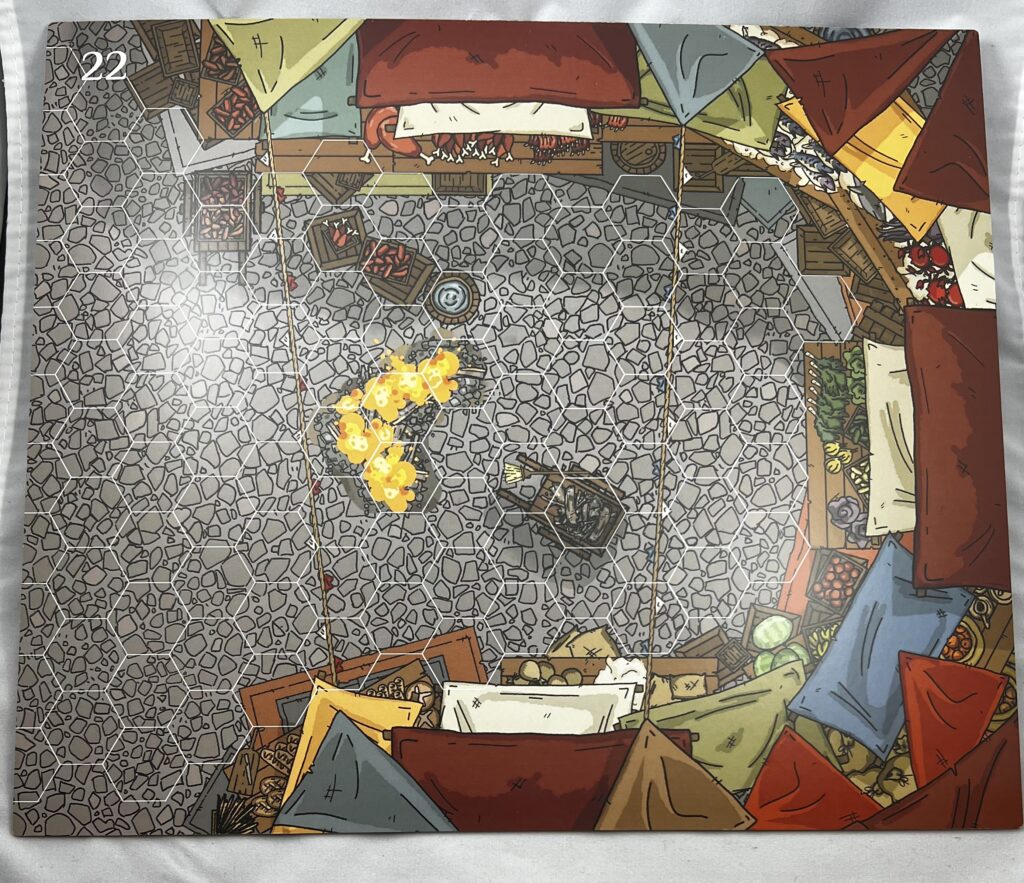
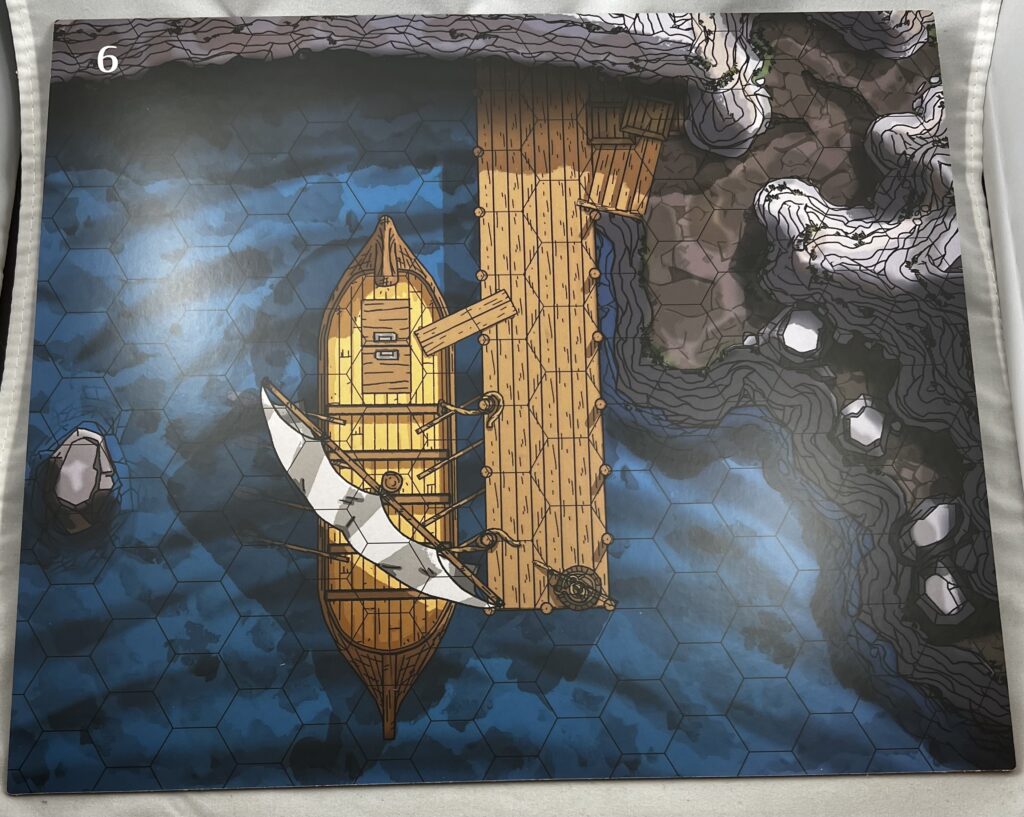

Miscellany
The remaining components bring quality to the table as well but not much versatility for other games. The two rulebooks come staple bound with glossy pages. The writing and the table of contents do a good job getting the concepts across, however the lack of an index will waste some time as you search for a specific rule. Splitting the rules into two books, while poignant to avoid a single oversized book, leaves players having to make a guess as to which book a particular rule might be in. For many rules references, this will be a simple answer but for more obscure searches, this can expend precious play time having to search one book then the other. A searchable rules reference and compendium in the app would be a great improvement.
The dice are nice. They are well engraved and well designed. I like the font that they chose and the design of the d4 intrigues. However, the d10’s, defense dice, and the crit die are all made with custom symbols that make them useful only for Pericle. Black plastic cubes also come with the game and are used for small swarm-like creatures.
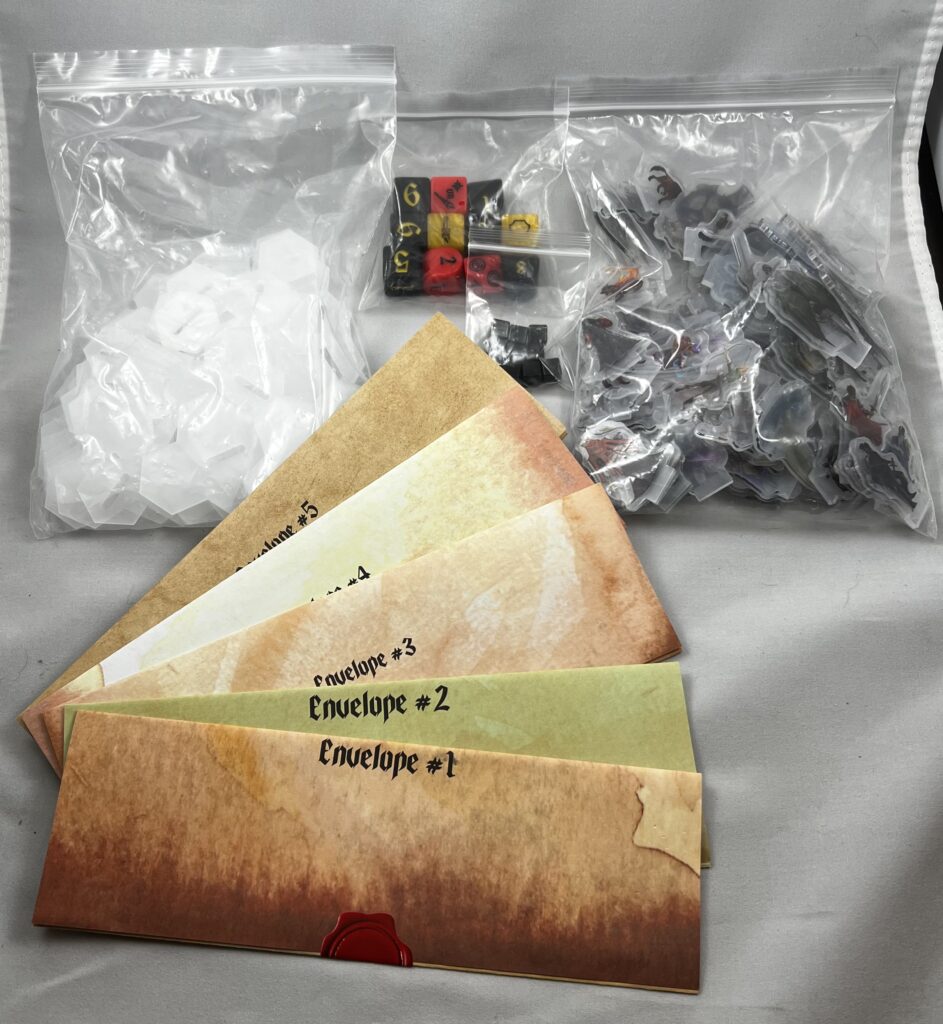
The App
Loremaster, the app, represents the beating heart and living brain of Pericle. In fact, without the app, there’s not really any playing that you can do. However, Loremaster will lead you through the story in a way that games relying on books and cards really can’t.
Players explore a lovingly crafted fantasy setting. With all of the information and lore in the app, the creators control access. This results in some difficulty getting a good grasp on the world. However, characters would not have a source book that reveals everything about their new environment and would instead have to explore, resulting in an experience that’s more immersive.
The writing is good and according to the publisher, there is over 400k words of it. That makes for one considerable adventure. The app generally offers intuitive controls although we have had a couple of instances in which we had to do some button mashing to undo mistakes. Pericle offers some tutorial time but it doesn’t cover everything.
Story
Loremaster delivers story and dialog through text, art, and occasionally video. The narrator performs well in the videos with the appropriate fantasy adventure voice. I would have enjoyed narration for all of the text but I recognize that would likely be cost prohibitive. As it stands, we have found that the best way is for one of us to read the text out loud, usually using accents and voices to help bring everything to life. Reading out loud while playing alone will also liven the game up, although others may think it a touch strange.
Combat
Battles rage through Loremaster as well. Players input the characters if they made them or choose pregenerated ones and that app will keep track of who is in the party. Players track their characters hp, stats, conditions, etc on their character sheets. Initiative is determined randomly by the app and it will walk players through the phases of combat. Pericle determines enemy movements and actions based on their conditions. This is an important point to track. Enemies react differently if they’re prone, embattled, or any of the other conditions. Not having to determine enemy actions frees players up to focus more on their characters and tactics.
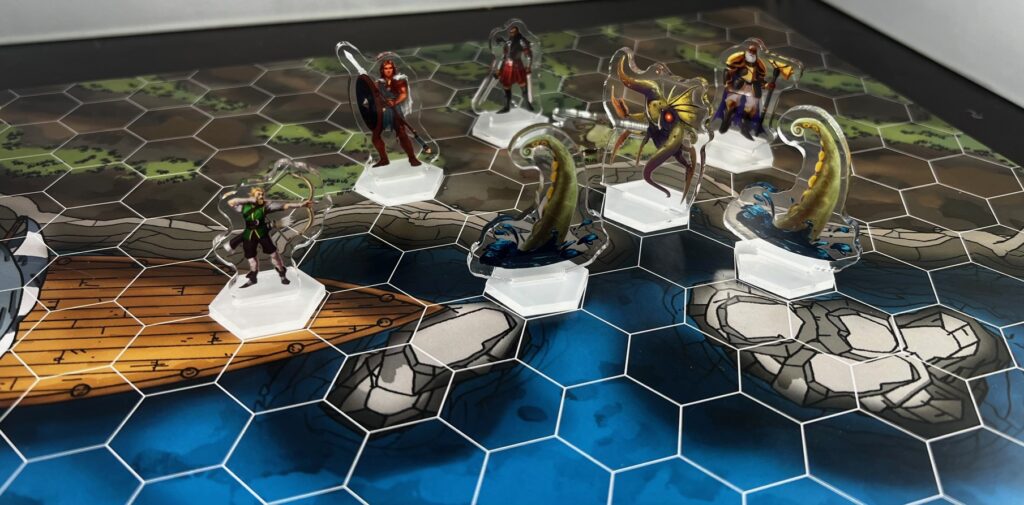
Rules
Currently, some rules are conveyed through tutorial sections, while most reside in the rule book. I would like to see a tutorial and help section that made the rule books superfluous. As it stands, certain rules get in depth explanations but at least one of the players will need to read through the rule book in order for everyone to really get playing. The rulebook authors wrote everything out very well. Pericle presents its rules in a clear and concise way. Although we may not have immediately understood every nuance, we were able to get started playing for a few encounters the first night we opened the box. For an expansive adventure game, that’s pretty impressive.
The Future
The creators of the game project significant growth in the Loremaster offerings. Evidently, there are third party creators that are lining up to offer their stories through the app. The first three episodes of Gathering Darkness are available with the fourth coming soon. Pericle includes these episodes in the base price and does not charge any additional fee for the app. The creators continue to work on the platform and the structure of future offerings. Regardless of what totally new material will be coming, Pericle continues to improve and be fine tuned through the data gathered from the app. That information allows encounters to be adjusted if too many parties are wiped out and typos to be fixed. Players can expect the game to get better over time rather than having to live with issues that all games have in their first printings.
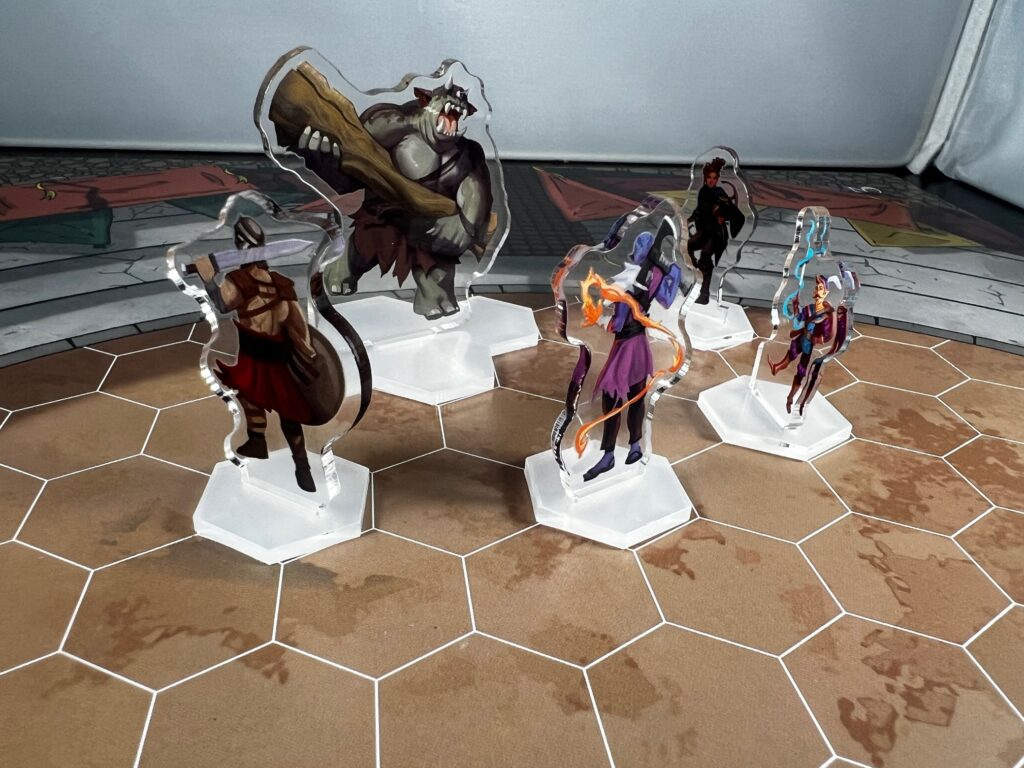
The Price and Value
This sticker will likely shock you. At $165, Pericle stands as the most expensive single game (not including expansions) in my collection. I love the components but do they justify the price? Certainly much of the expense of the game comes down to the app with its story, art, video, and narration. With the data collection available from the app, the creators of Pericle assure me that most of their players spent 45-65 hours just playing through the first two episodes. On the low end, that’s about $3.67/hr just for the first two episodes. Players do not pay for the additional episodes but that could double play time and essentially half the cost per hour.
Considering play time, players enjoy more of it due to considerably reduced amount of set up time. With no tokens to sort, no decks of cards to shuffle, and only large numbered tiles to search through, set up takes very little time. Searching through the standees to find the right ones costs a little time but not too much. Compared to games like Gloomhaven and Bardsung, Pericle races to the table. That’s a big deal considering how often we might be a bit late getting to game night and the thought of spending 20-30 minutes setting up dissuades us from many of the other games out there.
Shipping
Pericle also ships and delivers free so that cost is built into the price. When considering shipping, several of my other games start getting much closer in cost especially if they came from overseas. Yes, I agree. That up front cost feels like a lot. However, I see a lot of value in the story and app that will continue to get updated and tuned. Since the app doesn’t cost anything extra, everything added is simply part of the game.
Playing Solo
For the solo player, Pericle presents a touch of a conundrum. The tuning of the combat generally poses a challenge to parties of 3-4 characters. I know that a lot of solo players really enjoy the ability to play a game true solo, with only one character to keep up with. Unfortunately, that isn’t really an option here without some house-ruling. Characters tend to be specialized. Without the balance of multiple characters, as well as the damage output, a single character would have a much greater challenge surviving. So with multiple characters, a solo player faces the challenge of keeping up with all of them and understanding how they work. Characters from Pericle present less of a challenge than more complex TTRPG’s such as 5th Edition. However, character management will consume a fair amount of time as there are lots of Disciplines and spells to choose from.
Besides the number of characters, nothing else really demands your management skills. Set up gives little to no challenge and there are virtually no components to keep up with. With the app delivering the content, the player(s) frees up time to be immersed in the game and focus on their character(s).
Freedom
Most board games do not really require a discussion on freedom. You read the rules, you follow the gameplay loop, and you enjoy the components. Pericle brings something a little different to the table, especially with the advertisement of it being a GM-less tabletop RPG. Many of you and I love all sorts of different adventure and exploration games. Sometimes the game allows great freedom of choice but that tends to then require more creativity on the part of the player. Other times a game will offer as many choices as it can but it rarely manages to cover everything that you might want. My personal reaction to this usually associates with my expectations going into the game.
Looking at Pericle from the board game perspective allows me to see one of the best story lines that I’ve seen in a board game. The story and the characters flow much better than other board games that I’ve played where story delivery can be a little awkward and lacking in memorability. Pericle has stuck in my mind as well as one of the adventure book games such as Legendary Kingdoms. However, coming from the TTRPG side, a certain amount of necessary constraint presents itself. That’s not to say that there aren’t options, just don’t expect to be burning down the local tavern and starting fights in the streets. There’s not really any way that the creators could account for all of the ridiculous hijinks that RPG players tend to get up to.
Final Thoughts
Pericle presents very well as a TTRPG in a box that can be played without a GM. The components are really premium quality and I’ll be glad to have them for use with other games as well. The app shows iterative improvement and great potential. It even includes a feedback button so that you can let the developers know about issues or present new ideas to them. The system is pretty easy to learn but still offers good depth of choice. The story presents well through text and video in the app containing art that rivals many TTRPG books. The price point appears high, but when you’re spending $100 on a game that was backed on KS, then you get hit with the $50 shipping charge, you’ve already basically spent the same amount. Further, the speed of set up and the wealth of content mean that this game will make to the table easily. Altogether, Pericle gives a fun and immersive experience that doesn’t require 600 tokens, 1600 cards, and a story book.
Pen & Die gives Pericle an 8/10 both as a group and a solo board game/RPG experience. We have enjoyed our time with it. The components will help us tell other stories as well. Given the short set up time, Pericle offers the opportunity to get a full story game without too much preparation. So long as you don’t expect to go off the rails, Pericle contains many hours of fun with more to come as the developers continue tweaking the experience along the way.
If this sounds interesting, you can find Pericle on Amazon:
